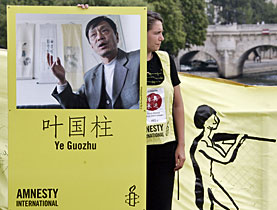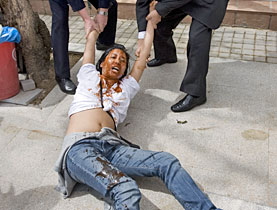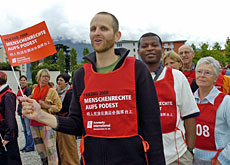Olympics body to examine censorship claims

The Swiss-based International Olympic Committee (IOC) says it will look into alleged media censorship within China ahead of the 2008 Beijing Games.
Amnesty International has condemned China’s human rights record and censorship of the media in the run up to the Games.
A report, published by Amnesty on Tuesday, found that human rights have continued to deteriorate in the country instead of improving, as promised by the Olympics hosts.
However, the Chinese foreign ministry rejected the claims, saying that people “who know China will not agree with this report”.
Amnesty says that days before the event is due to begin a number of foreign news websites have been blocked within China, which “flies in the face of official promises to ensure ‘complete media freedom’ for the Games”.
The human rights organisation says its own website is also barred. It also questions recent claims by IOC President Jacques Rogge that “quiet diplomacy” had led to several human rights reforms, including new regulations for foreign media.
“We welcome the IOC’s recognition of its role on human rights but given the current reality we are surprised at their confidence that foreign media will be able to report freely and that there will be no internet censorship,” said Roseann Rife of Amnesty International.
“They must speak out when the authorities violate the wider Olympic principles.”
IOC spokesman Kevan Gosper said they would examine anything that interfered with journalists doing their jobs in reporting the games.
“All of these things are a concern and we’ll investigate them. But our preoccupation is that the media are able to report on the games as they did in previous Games.
“Where it is not happening we’ll take the matter up with the Beijing Organising Committee of the Olympic Games and the authorities immediately.”
Olympic values
Amnesty’s report, The Olympics Countdown: Broken Promises, was published to mark the ten-day countdown to the Games.
It evaluates the performance of the Chinese authorities since 2001 in four areas related to the Olympic values of universal fundamental ethical principles and human dignity: specifically, the persecution of human rights activists, detention without trial, censorship and the death penalty.
Amnesty concludes that in most of these areas human rights have continued to deteriorate since April 2008, when its last report on the situation was published.
Websites including the Chinese versions of the BBC and Deutsche Welle, the Taiwanese newspaper Liberty Times and Amnesty International are all said to be blocked. The Foreign Correspondents Club of China documents around 260 cases of reporting being stopped since 2007.
Amnesty says individuals, who could threaten the image of stability that China wishes to portray, have been jailed or put under house arrest in the run up to the Games.
It cites the continued detention of Ye Guozhu, a housing rights activist who is serving a prison sentence for “stirring up trouble” while opposing the demolition of property to make way for Olympic construction projects.
Another organisation, Human Rights Watch, released a report earlier this month saying China was not living up to its promises.
Keeping promises
For its part, Amnesty welcomes a review of the death penalty initiated by the country’s Supreme People’s Court which is believed to have resulted in a significant drop in executions.
About 70 offences are punishable by death in China. But a senior official said that in the first half of 2008, 15 per cent of deaths sentences were rejected by the court.
Amnesty called for China to release all imprisoned peaceful activists, for foreign and national journalist to be able to report freely and for the country to make further progress towards the elimination of the death penalty.
“By continuing to persecute and punish those who speak out for human rights, the Chinese authorities have lost sight of the promises they made when they were granted the Games seven years ago,” said Rife.
In response, Chinese foreign ministry spokesman Liu Jianchao said: “We hope Amnesty can take off the tinted glasses it has worn for many years and see China in an objective way.”
swissinfo, Jessica Dacey and agencies
The Summer Games will be hosted by China from August 8-24. The Paralympics will take place from September 6-17.
The Games will be centred in the Chinese capital, Beijing, with six other venues hosting certain events, including Hong Kong (equestrian) and Shanghai (football).
About 10,700 athletes will compete in 302 events in 28 different sports. In the Paralympics 4,000 athletes will take part in 471 events encompassing 20 sports.
The decision to award the Olympic Games to Beijing has courted controversy, however, due to China’s poor human rights record, particularly in Tibet.
There have also been concerns about bad air quality at Olympic venues leading to the Swiss withdrawing their equestrian dressage team from the Games.

In compliance with the JTI standards
More: SWI swissinfo.ch certified by the Journalism Trust Initiative




You can find an overview of ongoing debates with our journalists here. Please join us!
If you want to start a conversation about a topic raised in this article or want to report factual errors, email us at english@swissinfo.ch.